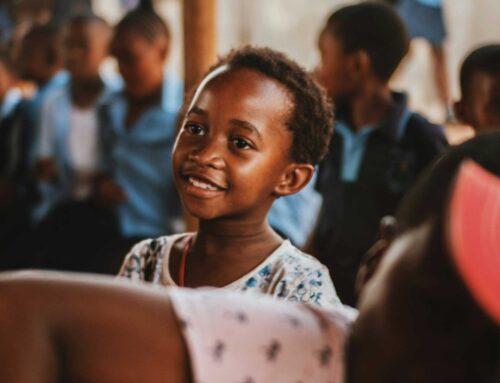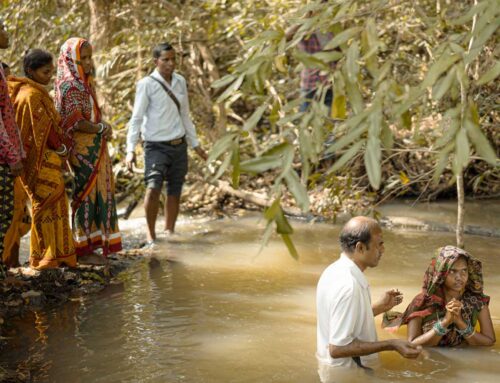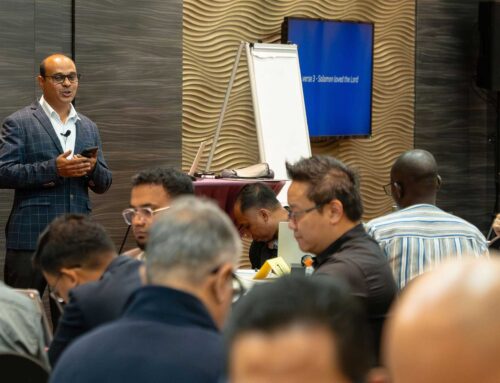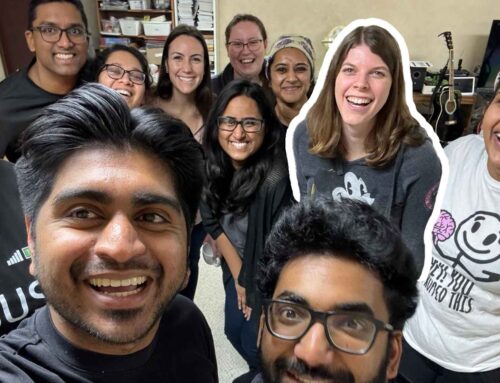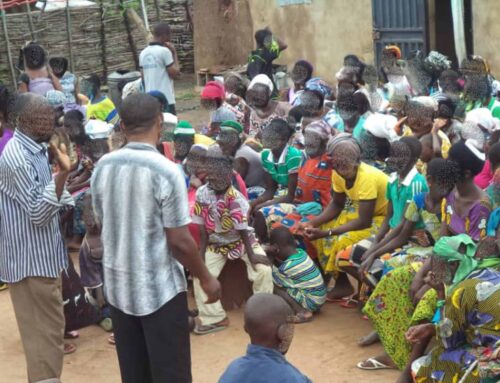Courage in Displacement and Need
Omari’s* country in North Africa is facing civil war. Millions of families are in a state of despair as they face extreme food insecurity, multiple disease outbreaks, and chronic internal displacement. In the middle of this, we find Haggai leader Omari restoring hope as he assists in shelter centers for displaced people and encourages Christians to adhere to their faith in suffering.
Omari’s job entails managing the Episcopal church among 7.5 million people, and through it, he shares the Word of God and organizes prayer and worship in his area. During his Haggai Leader Experience, his biblical and theological knowledge increased and he learned how to share the Gospel “in a modern way to suit the modern era.” He also came away feeling more equipped to identify false teachings in light of his new understanding of pluralism.
Omari describes his country as a family divided into two groups, with the majority being one religion and a much smaller percentage being Christian. He tells the story of an attack on a priest accused of misleading others in their faith. The priest was beaten, his Bible torn up, and a report was filed against him that led to his arrest and imprisonment.
When Omari visited the prison with a large group of believers, they entered singing praises and hymns. The prison director came out saying, “What’s wrong with you?”
“Our priest is your prisoner and we came to pray with him,” Omari replied. The prison director allowed three visitors in and they were astounded to find the priest preaching and sharing the Gospel, praying for the prisoners, and healing a sick man who came to faith and became a witness for Christ. A month later, the priest was released alongside two other prisoners who joined the group of believers at church.
Omari tells another story of a woman from a different religion who was displaced alongside Christians at the shelter. She had cancer and was struggling to get treatment. Omari describes the moment when she came to ask him, an employee of the church, to help her get treatment. He remembers, “I felt so empathetic but also powerless to help her. I told her, ‘Believe me, I am also displaced and we are living in the same situation.’ She wasn’t happy with my answer and that was clear on her face. She went back to the shelter, sad.
“I felt very embarrassed not to help her or at least pray with her and ask the Lord for healing. I heard an inner voice telling me to call her and pray with her, but I was in a struggle myself because [her faith would] not accept prayer with Jesus. Despite this, I was convicted to contact her and sent her a message saying that I could help with something better than financial aid if she allowed me.
“I will pray for God to heal you if you allow me,” Omari told her.
She replied, “There is no problem. Pray.” Omari asked God for a healing touch and to show her His love in a surprising way. After praying, he inquired, “Do you feel something now?”
“The pain and headache have stopped!” she professed, which opened the door for Omari to talk about Jesus Christ, the Healer.
Omari kept in touch with the woman and it was not long before she called him to say, “Come to the shelter, your prayers have been answered!” A man had donated 300,000 pounds for her treatment and expenses for five months.
Please join Omari in prayer for this woman and her family to accept Jesus as their Healer and Savior and for the restoration of hope in North Africa.
Written by Carolyn Grant
*Name changed for security.
Courage in Displacement and Need
Omari’s* country in North Africa is facing civil war. Millions of families are in a state of despair as they face extreme food insecurity, multiple disease outbreaks, and chronic internal displacement. In the middle of this, we find Haggai leader Omari restoring hope as he assists in shelter centers for displaced people and encourages Christians to adhere to their faith in suffering.
Omari’s job entails managing the Episcopal church among 7.5 million people, and through it, he shares the Word of God and organizes prayer and worship in his area. During his Haggai Leader Experience, his biblical and theological knowledge increased and he learned how to share the Gospel “in a modern way to suit the modern era.” He also came away feeling more equipped to identify false teachings in light of his new understanding of pluralism.
Omari describes his country as a family divided into two groups, with the majority being one religion and a much smaller percentage being Christian. He tells the story of an attack on a priest accused of misleading others in their faith. The priest was beaten, his Bible torn up, and a report was filed against him that led to his arrest and imprisonment.
When Omari visited the prison with a large group of believers, they entered singing praises and hymns. The prison director came out saying, “What’s wrong with you?”
“Our priest is your prisoner and we came to pray with him,” Omari replied. The prison director allowed three visitors in and they were astounded to find the priest preaching and sharing the Gospel, praying for the prisoners, and healing a sick man who came to faith and became a witness for Christ. A month later, the priest was released alongside two other prisoners who joined the group of believers at church.
Omari tells another story of a woman from a different religion who was displaced alongside Christians at the shelter. She had cancer and was struggling to get treatment. Omari describes the moment when she came to ask him, an employee of the church, to help her get treatment. He remembers, “I felt so empathetic but also powerless to help her. I told her, ‘Believe me, I am also displaced and we are living in the same situation.’ She wasn’t happy with my answer and that was clear on her face. She went back to the shelter, sad.
“I felt very embarrassed not to help her or at least pray with her and ask the Lord for healing. I heard an inner voice telling me to call her and pray with her, but I was in a struggle myself because [her faith would] not accept prayer with Jesus. Despite this, I was convicted to contact her and sent her a message saying that I could help with something better than financial aid if she allowed me.
“I will pray for God to heal you if you allow me,” Omari told her.
She replied, “There is no problem. Pray.” Omari asked God for a healing touch and to show her His love in a surprising way. After praying, he inquired, “Do you feel something now?”
“The pain and headache have stopped!” she professed, which opened the door for Omari to talk about Jesus Christ, the Healer.
Omari kept in touch with the woman and it was not long before she called him to say, “Come to the shelter, your prayers have been answered!” A man had donated 300,000 pounds for her treatment and expenses for five months.
Please join Omari in prayer for this woman and her family to accept Jesus as their Healer and Savior and for the restoration of hope in North Africa.
Written by Carolyn Grant
*Name changed for security.
Courage in Displacement and Need
Omari’s* country in North Africa is facing civil war. Millions of families are in a state of despair as they face extreme food insecurity, multiple disease outbreaks, and chronic internal displacement. In the middle of this, we find Haggai leader Omari restoring hope as he assists in shelter centers for displaced people and encourages Christians to adhere to their faith in suffering.
Omari’s job entails managing the Episcopal church among 7.5 million people, and through it, he shares the Word of God and organizes prayer and worship in his area. During his Haggai Leader Experience, his biblical and theological knowledge increased and he learned how to share the Gospel “in a modern way to suit the modern era.” He also came away feeling more equipped to identify false teachings in light of his new understanding of pluralism.
Omari describes his country as a family divided into two groups, with the majority being one religion and a much smaller percentage being Christian. He tells the story of an attack on a priest accused of misleading others in their faith. The priest was beaten, his Bible torn up, and a report was filed against him that led to his arrest and imprisonment.
When Omari visited the prison with a large group of believers, they entered singing praises and hymns. The prison director came out saying, “What’s wrong with you?”
“Our priest is your prisoner and we came to pray with him,” Omari replied. The prison director allowed three visitors in and they were astounded to find the priest preaching and sharing the Gospel, praying for the prisoners, and healing a sick man who came to faith and became a witness for Christ. A month later, the priest was released alongside two other prisoners who joined the group of believers at church.
Omari tells another story of a woman from a different religion who was displaced alongside Christians at the shelter. She had cancer and was struggling to get treatment. Omari describes the moment when she came to ask him, an employee of the church, to help her get treatment. He remembers, “I felt so empathetic but also powerless to help her. I told her, ‘Believe me, I am also displaced and we are living in the same situation.’ She wasn’t happy with my answer and that was clear on her face. She went back to the shelter, sad.
“I felt very embarrassed not to help her or at least pray with her and ask the Lord for healing. I heard an inner voice telling me to call her and pray with her, but I was in a struggle myself because [her faith would] not accept prayer with Jesus. Despite this, I was convicted to contact her and sent her a message saying that I could help with something better than financial aid if she allowed me.
“I will pray for God to heal you if you allow me,” Omari told her.
She replied, “There is no problem. Pray.” Omari asked God for a healing touch and to show her His love in a surprising way. After praying, he inquired, “Do you feel something now?”
“The pain and headache have stopped!” she professed, which opened the door for Omari to talk about Jesus Christ, the Healer.
Omari kept in touch with the woman and it was not long before she called him to say, “Come to the shelter, your prayers have been answered!” A man had donated 300,000 pounds for her treatment and expenses for five months.
Please join Omari in prayer for this woman and her family to accept Jesus as their Healer and Savior and for the restoration of hope in North Africa.
Written by Carolyn Grant
*Name changed for security.


